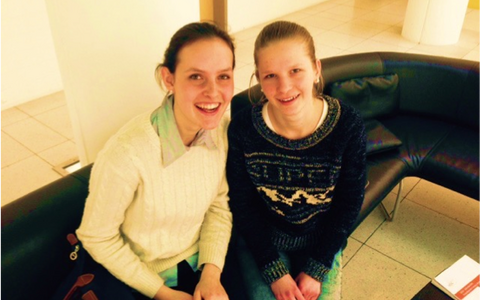Future Scientists at the MINT400 Forum
Every year MINT-EC, an association of mathematical and scientific centers of excellence at schools in Germany, organizes a meeting of this sort in Berlin for outstanding school students. At MDC the young scientists are welcomed by a succession of speakers, including Sylvia Löhrman, minister of education for North Rhine-Westphalia and Mark Rackles, Berlin’s secretary of state for education. Thomas Sommer, the scientific director of the MDC, describes the institute’s work to the young guests. He emphasizes that it is not only biologists and chemists who conduct research here: disciplines such as medicine, physics, mathematics and computer science also play a crucial part in answering fundamental questions about health and disease.
The chairman of the board of directors of the MINT-EC, Wolfgang Gollub, speaks with enthusiasm. “The MINT400 event is particularly suitable for generating the network spirit,” he says. The purpose of the association and its main sponsors, the employers’ organization Gesamtmetall / think ING and the Siemens Foundation, is to support excellent schools throughout Germany that perform outstandingly well in the natural sciences and to link them both with each other and with universities and science centers. When selecting the schools, particular importance is attached to the teachers’ performance and to first-class student achievement. The aim is to provide the best possible support for the very best and most gifted young students of the natural sciences through high-level teaching and extra-curricular activities – including participation, under the guidance of teachers, in competitions such as the young people’s research event Jugend forscht and the Mathematical Olympiad. “I have absolutely no concerns about this next generation of scientists,” says Gollub. In addition to their school-leaving qualification, the Abitur, the students receive a certificate summarizing their special achievements in three areas – the MINT subjects, propaedeutic work and additional MINT activities, which include events such as MINT400.
Scientific institutions, universities and companies take this opportunity at MDC to interest the high-flying youngsters in MINT courses and careers. Emma Hermanns and Daniela Odenthal, two students from the St. Anna School in Wuppertal, are inspired by the event and looking forward to the subsequent lectures and workshops. Daniela has already taken part in the chemistry section of Jugend forscht; she wants to study chemistry and business studies. She is waiting for the keynote speech by MDC scientist Erich Wanker on the state of research into Alzheimer’s disease, because this is the subject of the term paper she is writing. Emma, who excels in physics, is eager to hear what Emanuel Jacobi of DESY Zeuthen has to say about the project in which she is particularly interested – the neutrino detector known as the IceCube that is being built at the South Pole. At MDC the lectures are followed by laboratory tours and workshops led by Benedikt Obermayer (bioinformatics), the Sommer working group (cell metabolism) and the Daumke working group (protein characterization and X-ray crystallography).
On the second day of the event the keen young scientists disperse to venues around the city to attend workshops at places such as the Freie Universität (FU) Berlin and the German Aerospace Center (DLR). At the evening session at MDC they report enthusiastically on what they have learned during the day. Jörg Seidel and Sören Meiners give Monika Hebbeher, their accompanying teacher, a detailed update. They attend a MINT and European school, the Lessing Gymnasium in Lampertheim. “First we discussed the procedure and then we experimented with a vacuum photocell and a diffracted laser beam,” explains Jörg. He and Sören attended the workshop on “The World of Physics”. Sören, too, is pleased: “We were well looked-after by two FU students. When you are as close to the Abitur as we are, it’s a good opportunity to gather as much information as possible. The tour of the campus and the insight into university life were very helpful.” Jörg and Sören feel that being at a MINT school and being encouraged to go beyond the normal curriculum in a special MINT class makes good sense. “We have our own observatory at our school and have also visited CERN in Switzerland.” In addition, their high school works closely with the German Cancer Research Center (DKFZ) in Heidelberg. “In our MINT class we go through things a bit faster,” comments Jörg matter-of-factly. Both plan to study physics at university. Afterwards they may do a PhD, but that is still undecided and would be “planning too far in advance”.
A science slam rounds off the meeting. Daniel Beis, Nuria Cerdá-Esteban and Arndt Pechstein compete against each other, with André Lampe as moderator. The winner is Nuria, who no longer works as a researcher but is employed in science management at MDC.
Featured Image: Start of the conference: 400 school students and about 50 school teachers came to the capital forum MINT400 at the MDC. Photo: Undine Hill/MDC






